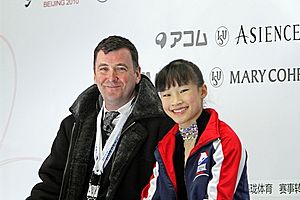Brian Orser facts for kids
Quick facts for kids
Brian Orser
|
||||||||||||||||||||||||||||||||||||||||||||||||||||
|---|---|---|---|---|---|---|---|---|---|---|---|---|---|---|---|---|---|---|---|---|---|---|---|---|---|---|---|---|---|---|---|---|---|---|---|---|---|---|---|---|---|---|---|---|---|---|---|---|---|---|---|---|
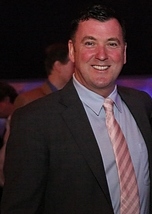
Brian Orser in 2014
|
||||||||||||||||||||||||||||||||||||||||||||||||||||
| Born |
Brian Ernest Orser
18 December 1961 Belleville, Ontario, Canada
|
|||||||||||||||||||||||||||||||||||||||||||||||||||
| Occupation |
|
|||||||||||||||||||||||||||||||||||||||||||||||||||
| Years active | 1977-present | |||||||||||||||||||||||||||||||||||||||||||||||||||
| Height | 5 ft 6.5 in (169 cm) | |||||||||||||||||||||||||||||||||||||||||||||||||||
| Spouse(s) | Rajesh Tiwari | |||||||||||||||||||||||||||||||||||||||||||||||||||
| Awards |
|
|||||||||||||||||||||||||||||||||||||||||||||||||||
|
||||||||||||||||||||||||||||||||||||||||||||||||||||
Brian Orser, born on December 18, 1961, is a famous Canadian figure skater and a coach for many Olympic champions. He won two silver medals at the Olympic Games (in 1984 and 1988). He was also the World champion in 1987 and won the Canadian national championship eight times in a row (from 1981 to 1988).
At the 1988 Winter Olympics, people called the competition between Brian Orser and American skater Brian Boitano the "Battle of the Brians". This was because they were both top contenders for the gold medal. After 1988, Brian became a professional skater and performed with Stars on Ice for nearly 20 years. As a coach, he helped skaters like Yuna Kim (who won in 2010) and Yuzuru Hanyu (who won in 2014 and 2018) become Olympic champions. He also coached Javier Fernández to an Olympic bronze medal in 2018 and two World titles in 2015 and 2016. Today, he works as a skating consultant at the Toronto Cricket Skating and Curling Club.
Contents
Early Life and Skating Start
Brian Orser was born in Belleville, Ontario, Canada. He grew up in a town called Penetanguishene. He is the youngest of five children in his family.
Brian started his skating journey early. He won his first national title at the novice level in 1977. The next year, he competed at the Junior World Championships and finished 4th. In 1979, he won another national title, this time at the junior level.
Competitive Skating Career
In 1980, Brian moved up to the senior level in figure skating. He won a bronze medal at his first senior international competition, the Vienna Cup. He then placed 4th at the Canadian Figure Skating Championships. This was the last time he would finish off the podium at the national level.
Rising to the Top
The 1980–1981 season was a big one for Brian. He won a silver medal at the Nebelhorn Trophy and then his first of eight Canadian National titles. In his first appearance at the World Championships, he placed 6th. The next season, he won his first medal at Skate Canada and moved up to 4th at Worlds. He won his first World medal, a bronze, in 1983. This set him up well for the 1983–1984 Olympic season.
Mastering the Triple Axel
Brian Orser was only the second man ever to land a triple Axel in competition. He did this when he won his Canadian junior title in 1979. At that time, very few senior skaters were even trying this difficult jump. Over the next few years, Brian performed the triple Axel more often and more consistently than any other skater. He was also the first man to land a triple Axel at the Olympics, which he did in his free skate at the 1984 Winter Olympics. He won the silver medal there, finishing behind Scott Hamilton. He also won silver at the 1984 Worlds, again behind Hamilton. Brian's lower scores in the compulsory figures part of the competition kept him from winning gold in both events.
After Scott Hamilton retired in the 1984–1985 season, many thought Brian would become the top champion. However, he had some mistakes at the World Championships and placed second to Alexander Fadeev. Fadeev also had a strong triple Axel. Brian decided to include two triple Axels in his free skate to gain an advantage. He finally won the World Championships in 1987. At that competition, he became the first skater to land two triple Axels in the free skate and three in the entire competition.
The "Battle of the Brians"
Leading up to the 1988 Olympics, Brian Orser worked with a sports psychologist to help with his mental game. He and Brian Boitano were the main rivals, and their competition was called the "Battle of the Brians." Brian Orser had not lost a competition since 1986. At the Olympics, Brian Orser was chosen to be the flag-bearer for Canada during the opening ceremonies. He placed 3rd in the compulsory figures, 1st in the short program, and 2nd in the free skating. He won the silver medal overall, losing to Brian Boitano by a very small margin of 0.10 points.
He won another silver medal at the World Championships in 1988 after winning the free skate. Brian Orser then decided to become a professional skater after that season. He had not finished lower than third place in any competition since 1982. During his competitive career, he trained at the Mariposa School of Skating. An arena in Orillia was named after him in 1984.
Professional Skating and Coaching
After ending his competitive career in 1988, Brian Orser began touring with Stars on Ice. He performed with them for almost 20 years, with his last show in 2007.
Brian also starred in the 1990 German skating film Carmen on Ice. He performed alongside his rival Brian Boitano and Katarina Witt. The movie told the story of Carmen through ice skating, and Brian played the part of Escamillo.
Brian performed in many ice shows and was known for being one of the few skaters who could do a backflip. In 2007, he broke his wrist while stepping backward off the ice. After that, he decided to stop doing backflips and reduced his participation in ice shows.
Coaching Success
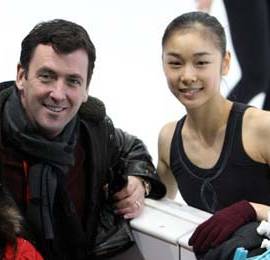
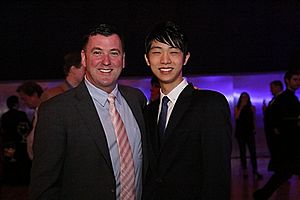
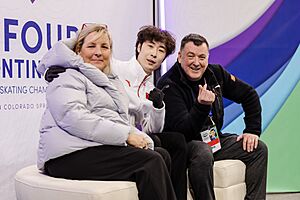
Brian Orser is now a head instructor at the Toronto Cricket Skating and Curling Club, working with Tracy Wilson. He has coached many top skaters to success.
His current students include:
 Victoria Barakhtina (since August 2024)
Victoria Barakhtina (since August 2024) Lucas Broussard (since May 2025)
Lucas Broussard (since May 2025) Jason Brown (since summer 2018), who won silver at the 2020 Four Continents Championships.
Jason Brown (since summer 2018), who won silver at the 2020 Four Continents Championships.
 Corey Circelli (since 2013).
Corey Circelli (since 2013). Jin Boyang (since 2022–23 season).
Jin Boyang (since 2022–23 season). Rika Kihira (since September 2021).
Rika Kihira (since September 2021). Pimmpida Lerdpraiwan (since 2024).
Pimmpida Lerdpraiwan (since 2024). Grayson Long (since 2019).
Grayson Long (since 2019). Kaiya Ruiter (since September 2024).
Kaiya Ruiter (since September 2024). Hetty Shi (since 2024).
Hetty Shi (since 2024). Seigo Tauchi (since summer 2025).
Seigo Tauchi (since summer 2025).
Some of his former students include:
 Cha Jun-hwan (2015-2023), who won the 2022 Four Continents title and silver at the 2023 World Championships.
Cha Jun-hwan (2015-2023), who won the 2022 Four Continents title and silver at the 2023 World Championships. Gabrielle Daleman (2015-2019), who won bronze at the 2017 World Championships.
Gabrielle Daleman (2015-2019), who won bronze at the 2017 World Championships. Javier Fernández (2011-2019), who won Olympic bronze in 2018, two World Championships (2015, 2016), and seven European titles.
Javier Fernández (2011-2019), who won Olympic bronze in 2018, two World Championships (2015, 2016), and seven European titles. Yuzuru Hanyu (2012-2022), who won two Olympic titles (2014, 2018) and two World Championships (2014, 2017).
Yuzuru Hanyu (2012-2022), who won two Olympic titles (2014, 2018) and two World Championships (2014, 2017). Yuna Kim (2007-2010), who won the 2009 World Championships and 2010 Olympic gold.
Yuna Kim (2007-2010), who won the 2009 World Championships and 2010 Olympic gold. Evgenia Medvedeva (2018-2020), who won bronze at the 2019 World Championships.
Evgenia Medvedeva (2018-2020), who won bronze at the 2019 World Championships. Nam Nguyen (2012-2016), who won the 2014 World Junior Championships.
Nam Nguyen (2012-2016), who won the 2014 World Junior Championships.
Awards and Recognition
Brian Orser has received many awards and honors for his contributions to figure skating. He was made a Member of the Order of Canada in 1985 and then promoted to Officer of the same order in 1988.
He also won an Emmy Award for his performance in Carmen on Ice after it was shown on HBO.
Brian Orser has been inducted into several halls of fame:
- Canada's Sports Hall of Fame, 1989
- Canadian Olympic Hall of Fame, 1995
- Midland (Ontario) Sports Hall of Fame, 1998
- Penetanguishene Sports Hall of Fame, 2003
- World Figure Skating Hall of Fame, 2009
- Ontario Sports Hall of Fame, 2012
Images for kids
See also
 In Spanish: Brian Orser para niños
In Spanish: Brian Orser para niños
 | Kyle Baker |
 | Joseph Yoakum |
 | Laura Wheeler Waring |
 | Henry Ossawa Tanner |


